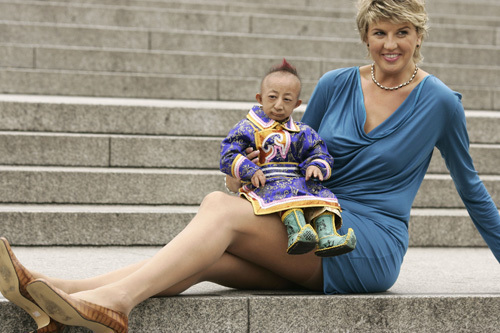He became the second Nigerian leader to die of natural causes while in office, as the late dictator, Gen. Sani Abacha, who died on June 8, 1998. Other Nigerian leaders who had died in office were Prime Minister Tafawa Balewa Maj.-Gen. Thomas Aguiyi-Ironsi and Gen. Murtala Muhammed. They were killed during attempts to overthrow their governments in 1966 and 1976 respectively.
Presidential Special Adviser on Media and Publicity, Mr. Olusegun Adeniyi, told The Associated Press that Yar’Adua died at 9pm on Wednesday at the Presidential Villa, with his wife, Turai, at his side. Adeniyi, whose voice cracked with emotion as he spoke did not give a cause of death.
By virtue of Section 146 of the 1999 Constitution, Acting President Goodluck Jonathan automatically becomes the President. It reads, ”The Vice-President shall hold the office of President if the office of President becomes vacant by reason of death or resignation, impeachment, permanent incapacity or the removal of the President from office for any other reason in accordance with section 143 of this Constitution.”
THE PUNCH learnt that news of Yar‘Adua‘s death first filtered out shortly after he breathed his last when some presidential aides briefed Jonathan and the National Security Adviser, Lt.-Gen. Aliyu Gusau (retd.), about his death.
The Federal Governmment immediately declared today as a public holiday. It also declared seven days of mourning, during which flags will fly at half-mast.
Yar’Adua spent much of his time as the governor of Katsina State (1999-2007) battling a kidney-related ailment. But his supporters he claimed had recovered sufficiently to contest the 2007 presidential election, after he got a kidney transplant.
At a point during his tenure as governor, Yar‘Adua spent six months at a stretch in a German hospital. But not long after he won the presidential election and was inaugurated, his health failed and he had to be flown abroad on a few occasions for treatment.
Although the exact nature of Yar‘Adua‘s frequent illness was never truly known, as his medical trips abroad were always shrouded in secrecy, the Presidency gave an indication of the nature of the sickness after he was flown to Saudi Arabia on November 23, 2009 for medical treatment.
His personal physician, Dr. Salisu Banye, told newsmen on November 26 that Yar‘Adua was being treated for acute pericarditis, an inflamation of the membrane surrounding the heart.
However, Saharareporters, an online medium, had, in a series of reports, insisted that the President suffered from the terminal Churg Strauss syndrome.
Last November, he was admitted to the King Faisal Specialist Hospital and Research Centre in Jeddah, Saudi Arabia, where he spent 93 days before being flown back to Nigeria under the cover of darkness.
After his return on February 23, he was kept incommunicado at the Presidential Villa and was shielded from his deputy. In fact, in an interview with the British Broadcasting Corporation last month, Jonathan said the President‘s family was shielding Yar‘Adua from him.
He said he had only been able to meet with the President‘s wife while attempts to see Yar‘Adua and assess his condition were rebuffed.
Due to the uncertainty that surrounded Yar‘Adua‘s medical condition, the National Assembly on February 9, 2010 passed a resolution declaring Jonathan as the Acting President.
The news of the President‘s death immediately spread like wildfire across the country, with many Nigerians expressing shock and grief at the 58-year-old President‘s demise. Also, various cable channels across the world broadcast news breaks of Yar’Adua’s death intermittently.
Reactions started pouring in within a few hours of his death. Kwara State governor Bukola Saraki, who is also the chairman of Nigerian Governors’ Forum, said, “As a Muslim, the first reaction is that everyone will pay the ultimate price and death will come when it will come. The passing on of the President at this point in time in our national history is not only tragic but devastating. It‘s indeed a colossal loss to the nation and Africa.”
Nobel Laureate, Prof. Wole Soyinka, in his tribute, wrote, “What passes for the Nigerian nation is nothing more than a tragic arena, and Yar‘Adua is only the latest tragic figure. The vampires, including those within his own family, turned him into a mere inert resource for their diabolical schemes.
“They have a reckoning with their conscience, assuming they know what the word means. One can only hope that, while mouthing sanctimonious platitudes such as ‘Power belongs to God,’ they have now learnt that the politics of Do-or-Die cannot guarantee who does and who dies. They must stop playing God. I pray for the repose of the soul of their latest, much abused innocent victim. Wole Soyinka.”
In his reaction, Ondo State Governor Olusegun Mimiko described the President‘s transition as a sad loss to the nation. Mimiko, in a statement issued by his Chief Press Secretary, Mr. Kolawole Olabisi, described the late President as an apostle of democracy, who maintained a firm belief in the Rule of Law and fairplay.
In his reaction, Kogi State Governor Ibrahim Idris said in a statement by his Chief Press Secretary, Mr. Richard Elesho, “We would like to keep our fingers crossed, taking into cognisance that the power of life and death are the in the hands of God. We have to accept it as the will of God. We condole with the family and pray God grants them the fortitude to bear the loss. The man suffered for so long. It’s indeed a big loss.”







![feat1_24042010[1].jpg](http://odili.net/news/source/2010/may/1/tribune/images/feat1_24042010%5B1%5D.jpg)



![ojukwu-point[1].gif](http://odili.net/news/source/2010/may/3/sun/ojukwu-point%5B1%5D.gif)
![pix2010050118583053[1].jpg](http://odili.net/news/source/2010/may/3/punch/images/pix2010050118583053%5B1%5D.jpg)